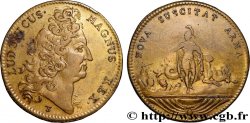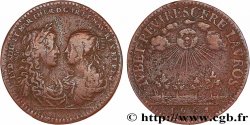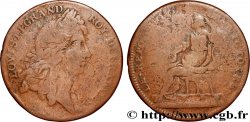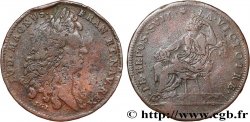v24_1528 - LOUIS XIV LE GRAND ou LE ROI SOLEIL États de Bourgogne 1653
MONNAIES 24 (2005)
Начальная цена : 150.00 €
Назначить цену : 250.00 €
Цена реализации : 150.00 €
Количество ставок : 1
Максимальная предлагаемая цена : 187.00 €
Начальная цена : 150.00 €
Назначить цену : 250.00 €
Цена реализации : 150.00 €
Количество ставок : 1
Максимальная предлагаемая цена : 187.00 €
Тип États de Bourgogne
Дата: 1653
Металл: silver
Диаметр: 27,5 mm
Ориентация осей монеты: 6 h.
Вес: 6,41 g.
Век: lisse
Редкость: R1
Комментарии о состоянии
Jolie patine mettant en valeur les reliefs du droit. Petit défaut de métal au revers à 5 heures
Ссылки в каталоге: :
Происхождение:
Jeton provenant de la collection M.L.F.A.
Лицевая сторона
Аверс: легенда: (ROSE) COMITIA (ROSE) BVRGVNDIÆ (ROSE).
Аверс: описание: Écu de Bourgogne entouré d’une couronne fleuronné ; à l’exergue 1653.
Аверс: перевод: (États de Bourgogne).
Обратная сторона
Реверс: легенда: LIBERATORI. DEBITAM. REPENDO.
Реверс: Описание: Femme debout à gauche devant le roi auquel elle offre une couronne et une branche d'olivier ; la ville d'Arras à l'horizon; à l'exergue, un fleuron.
Реверс: перевод: J'offre à mon libérateur la couronne qui lui est due.
Комментарий
Les Frondeurs se réfugièrent une nouvelle fois à Seurre lorsqu’ils apprirent la libération du prince de Condé. Durant l’exil de celui-ci en Guyenne, la ville est prise par d’Épernon qui fait raser les fortifications. Le roi est présenté comme le libérateur de la province.
Les États de Bourgogne ont fait l'objet de plusieurs études : Rossignol en 1851 ; Preux dans l'ASFN en 1867 et Fontenay, Manuel de l'amateur de jetons, 1854 auquel nous empruntons de nombreuses descriptions de jetons ainsi que les commentaires suivants : "Les États de Bourgogne votaient les impôts, aides et subsides. La province réglait son administration économique dans des assemblées générales, et après les sessions, l'exécution des votes appartenait à des Élus généraux pris dans tous les rangs de la société et dont la conduite était censurée à chaque triennalité par des commissaires spéciaux et indépendants. Les Élus faisaient la répartition des impôts, et pour cela ils nommaient de droit tous leurs officiers, ordonnaient les constructions publiques et les réparations des grandes routes, réglaient la levée et la dépense des milices, opéraient la liquidation des étapes, l'adjudication des octrois sur la Saône et tenaient en leurs mains l'importante direction des crues sur le sel que l'on ne pouvait amener en Bourgogne sans leur approbation. Les habitants n'étaient point traduits hors de leur ressort. Les États avaient le droit de rembourser de leurs finances tout office à la charge du pays ; le roi ne pouvait en créer de nouveaux sans le consentement de la province, et moins encore disposer de la province sans son aveu. (...) Quelques mots suffiront pour donner une idée de l'organisation des États de Bourgogne. Ils se composaient des trois positions sociales ou des trois Ordres de la société, le Clergé, la Noblesse et le Tiers-État. Le premier représentait la sagesse, les lumières et la bonté ; le second, la force, la gloire et la grandeur ; le troisième, l'industrie, le commerce et l'agriculture. On ne pouvait trouver rien de plus juste et de plus complet. L'inégalité numérique des trois Ordres disparaissait au moment du vote : au moment solennel de la décision, il n'y avait que trois voix ; et celle du Tiers, qui eût été insignifiante si l'on avait compté par têtes, avait le pouvoir de faire pencher la balance du côté où elle voulait. La représentation des pouvoirs se complétait par la présence aux États des envoyés de Mgr le Duc et plus tard de ceux de Sa Majesté. L'Élu du premier avait pour mission de veiller d'une manière toute spéciale sur les intérêts de la couronne ducale et de l'édifier sur tout ce qui se passait dans l'administration des finances. Sous le régime monarchique, le roi s'appuyait encore sur le Parlement dont le président prenait la parole à l'ouverture des États pour soutenir les demandes de la couronne ; il avait de plus l'intendant et le gouverneur de la province ; puis la chambre des comptes dont les Maîtres étaient plus habitués que personne au maniement des jetons. Après une session d'un mois, l'assemblée générale laissait pour administrer le pays, pendant trois années, une petite assemblée ou Chambre des Élus généraux composée, comme elle, des éléments intéressés, c'est-à-dire appartenant aux trois Ordres. L'Élu du roi, deux députés de la chambre des comptes, le trésorier général et l'intendant de la province avaient droit d'y entrer pour la couronne, comme les deux secrétaires des États, mais sans voix délibérative. L'Élu de la Noblesse était seul électif ; ceux du Clergé et du Tiers arrivaient alternativement à la Chambre. L'Église fournissait tantôt un évêque, tantôt un abbé, tantôt un doyen de la province à tour de rôle. Le représentant du Tiers-État était successivement un maire de l'une des quatorze villes inscrites à la grande roue ; et par privilège, cet Ordre avait encore son président-né, le maire de Dijon. Les petites villes ainsi que les chanoines et les prieurs n'étaient pas privés de leur part de pouvoir, car c'est dans leur sein que se recrutait la majeure partie des Alcades. Les Alcades formaient un conseil de censure qui recherchait en outre les choses utiles à proposer au pays et surveillait les opérations de la grande roue. Ils composaient un conseil suprême pour protéger la province contre l'erreur, la négligence, le mauvais vouloir ou l'ambition de ses administrateurs. En somme, le grand conseil était jugé par le petit.
The Frondeurs took refuge once again in Seurre when they learned of the release of the Prince of Condé.. During his exile in Guyenne, the town was taken by d'Épernon who had the fortifications razed. The king is presented as the liberator of the province.
The States of Burgundy have been the subject of several studies: Rossignol in 1851; Preux in the ASFN in 1867 and Fontenay, Manuel de l'amateur de jetons, 1854 from which we borrow numerous descriptions of tokens as well as the following comments: \\\"The States of Burgundy voted on taxes, aid and subsidies. The province regulated its economic administration in general assemblies, and after the sessions, the execution of the votes belonged to general elected officials taken from all ranks of society and whose conduct was censured every three years by special and independent commissioners.. The Elected made the distribution of taxes, and for this they appointed by right all their officers, ordered public constructions and the repairs of the main roads, regulated the raising and expenditure of the militias, carried out the liquidation of the stages, the adjudication of the octrois on the Saône and held in their hands the important direction of the floods on the salt which could not be brought to Burgundy without their approval.. The inhabitants were not taken outside their jurisdiction. The States had the right to reimburse from their finances any office charged to the country; the king could not create new ones without the consent of the province, and even less dispose of the province without its consent.. (. . . ) A few words will suffice to give an idea of the organization of the States of Burgundy. They consisted of the three social positions or three Orders of society, the Clergy, the Nobility and the Third Estate. The first represented wisdom, enlightenment and goodness; the second, strength, glory and greatness; the third, industry, commerce and agriculture.. Nothing could be more just and more complete.. The numerical inequality of the three Orders disappeared at the time of the vote: at the solemn moment of the decision, there were only three votes; and that of the Third Estate, which would have been insignificant if one had counted by heads, had the power to tip the balance in whichever direction it wanted.. The representation of powers was completed by the presence in the States of the envoys of Mgr the Duke and later of those of His Majesty. The first elected official had the mission of watching over the interests of the ducal crown in a very special way and of informing it on everything that happened in the administration of finances.. Under the monarchical regime, the king still relied on Parliament, whose president spoke at the opening of the Estates to support the demands of the crown; he also had the intendant and the governor of the province; then the chamber of accounts, whose Masters were more accustomed than anyone to handling tokens.. After a one-month session, the general assembly left to administer the country for three years a small assembly or Chamber of General Elect composed, like itself, of interested elements, that is to say belonging to the three Orders.. The King's Elect, two deputies of the Chamber of Accounts, the general treasurer and the intendant of the province had the right to enter for the crown, like the two secretaries of the States, but without deliberative voice.. The Elect of the Nobility was the only elective; those of the Clergy and the Third Estate arrived alternately in the Chamber. The Church provided sometimes a bishop, sometimes an abbot, sometimes a dean of the province in turn.. The representative of the Third Estate was successively a mayor of one of the fourteen towns registered on the Ferris wheel; and by privilege, this Order still had its natural president, the mayor of Dijon. The small towns, as well as the canons and priors, were not deprived of their share of power, because it was from among them that the majority of the Alcaldes were recruited.. The Alcaldes formed a censorship council which also looked for useful things to propose to the country and supervised the operations of the Ferris wheel.. They formed a supreme council to protect the province against the error, negligence, ill will or ambition of its administrators. In short, the great council was judged by the small one.
Les États de Bourgogne ont fait l'objet de plusieurs études : Rossignol en 1851 ; Preux dans l'ASFN en 1867 et Fontenay, Manuel de l'amateur de jetons, 1854 auquel nous empruntons de nombreuses descriptions de jetons ainsi que les commentaires suivants : "Les États de Bourgogne votaient les impôts, aides et subsides. La province réglait son administration économique dans des assemblées générales, et après les sessions, l'exécution des votes appartenait à des Élus généraux pris dans tous les rangs de la société et dont la conduite était censurée à chaque triennalité par des commissaires spéciaux et indépendants. Les Élus faisaient la répartition des impôts, et pour cela ils nommaient de droit tous leurs officiers, ordonnaient les constructions publiques et les réparations des grandes routes, réglaient la levée et la dépense des milices, opéraient la liquidation des étapes, l'adjudication des octrois sur la Saône et tenaient en leurs mains l'importante direction des crues sur le sel que l'on ne pouvait amener en Bourgogne sans leur approbation. Les habitants n'étaient point traduits hors de leur ressort. Les États avaient le droit de rembourser de leurs finances tout office à la charge du pays ; le roi ne pouvait en créer de nouveaux sans le consentement de la province, et moins encore disposer de la province sans son aveu. (...) Quelques mots suffiront pour donner une idée de l'organisation des États de Bourgogne. Ils se composaient des trois positions sociales ou des trois Ordres de la société, le Clergé, la Noblesse et le Tiers-État. Le premier représentait la sagesse, les lumières et la bonté ; le second, la force, la gloire et la grandeur ; le troisième, l'industrie, le commerce et l'agriculture. On ne pouvait trouver rien de plus juste et de plus complet. L'inégalité numérique des trois Ordres disparaissait au moment du vote : au moment solennel de la décision, il n'y avait que trois voix ; et celle du Tiers, qui eût été insignifiante si l'on avait compté par têtes, avait le pouvoir de faire pencher la balance du côté où elle voulait. La représentation des pouvoirs se complétait par la présence aux États des envoyés de Mgr le Duc et plus tard de ceux de Sa Majesté. L'Élu du premier avait pour mission de veiller d'une manière toute spéciale sur les intérêts de la couronne ducale et de l'édifier sur tout ce qui se passait dans l'administration des finances. Sous le régime monarchique, le roi s'appuyait encore sur le Parlement dont le président prenait la parole à l'ouverture des États pour soutenir les demandes de la couronne ; il avait de plus l'intendant et le gouverneur de la province ; puis la chambre des comptes dont les Maîtres étaient plus habitués que personne au maniement des jetons. Après une session d'un mois, l'assemblée générale laissait pour administrer le pays, pendant trois années, une petite assemblée ou Chambre des Élus généraux composée, comme elle, des éléments intéressés, c'est-à-dire appartenant aux trois Ordres. L'Élu du roi, deux députés de la chambre des comptes, le trésorier général et l'intendant de la province avaient droit d'y entrer pour la couronne, comme les deux secrétaires des États, mais sans voix délibérative. L'Élu de la Noblesse était seul électif ; ceux du Clergé et du Tiers arrivaient alternativement à la Chambre. L'Église fournissait tantôt un évêque, tantôt un abbé, tantôt un doyen de la province à tour de rôle. Le représentant du Tiers-État était successivement un maire de l'une des quatorze villes inscrites à la grande roue ; et par privilège, cet Ordre avait encore son président-né, le maire de Dijon. Les petites villes ainsi que les chanoines et les prieurs n'étaient pas privés de leur part de pouvoir, car c'est dans leur sein que se recrutait la majeure partie des Alcades. Les Alcades formaient un conseil de censure qui recherchait en outre les choses utiles à proposer au pays et surveillait les opérations de la grande roue. Ils composaient un conseil suprême pour protéger la province contre l'erreur, la négligence, le mauvais vouloir ou l'ambition de ses administrateurs. En somme, le grand conseil était jugé par le petit.
The Frondeurs took refuge once again in Seurre when they learned of the release of the Prince of Condé.. During his exile in Guyenne, the town was taken by d'Épernon who had the fortifications razed. The king is presented as the liberator of the province.
The States of Burgundy have been the subject of several studies: Rossignol in 1851; Preux in the ASFN in 1867 and Fontenay, Manuel de l'amateur de jetons, 1854 from which we borrow numerous descriptions of tokens as well as the following comments: \\\"The States of Burgundy voted on taxes, aid and subsidies. The province regulated its economic administration in general assemblies, and after the sessions, the execution of the votes belonged to general elected officials taken from all ranks of society and whose conduct was censured every three years by special and independent commissioners.. The Elected made the distribution of taxes, and for this they appointed by right all their officers, ordered public constructions and the repairs of the main roads, regulated the raising and expenditure of the militias, carried out the liquidation of the stages, the adjudication of the octrois on the Saône and held in their hands the important direction of the floods on the salt which could not be brought to Burgundy without their approval.. The inhabitants were not taken outside their jurisdiction. The States had the right to reimburse from their finances any office charged to the country; the king could not create new ones without the consent of the province, and even less dispose of the province without its consent.. (. . . ) A few words will suffice to give an idea of the organization of the States of Burgundy. They consisted of the three social positions or three Orders of society, the Clergy, the Nobility and the Third Estate. The first represented wisdom, enlightenment and goodness; the second, strength, glory and greatness; the third, industry, commerce and agriculture.. Nothing could be more just and more complete.. The numerical inequality of the three Orders disappeared at the time of the vote: at the solemn moment of the decision, there were only three votes; and that of the Third Estate, which would have been insignificant if one had counted by heads, had the power to tip the balance in whichever direction it wanted.. The representation of powers was completed by the presence in the States of the envoys of Mgr the Duke and later of those of His Majesty. The first elected official had the mission of watching over the interests of the ducal crown in a very special way and of informing it on everything that happened in the administration of finances.. Under the monarchical regime, the king still relied on Parliament, whose president spoke at the opening of the Estates to support the demands of the crown; he also had the intendant and the governor of the province; then the chamber of accounts, whose Masters were more accustomed than anyone to handling tokens.. After a one-month session, the general assembly left to administer the country for three years a small assembly or Chamber of General Elect composed, like itself, of interested elements, that is to say belonging to the three Orders.. The King's Elect, two deputies of the Chamber of Accounts, the general treasurer and the intendant of the province had the right to enter for the crown, like the two secretaries of the States, but without deliberative voice.. The Elect of the Nobility was the only elective; those of the Clergy and the Third Estate arrived alternately in the Chamber. The Church provided sometimes a bishop, sometimes an abbot, sometimes a dean of the province in turn.. The representative of the Third Estate was successively a mayor of one of the fourteen towns registered on the Ferris wheel; and by privilege, this Order still had its natural president, the mayor of Dijon. The small towns, as well as the canons and priors, were not deprived of their share of power, because it was from among them that the majority of the Alcaldes were recruited.. The Alcaldes formed a censorship council which also looked for useful things to propose to the country and supervised the operations of the Ferris wheel.. They formed a supreme council to protect the province against the error, negligence, ill will or ambition of its administrators. In short, the great council was judged by the small one.







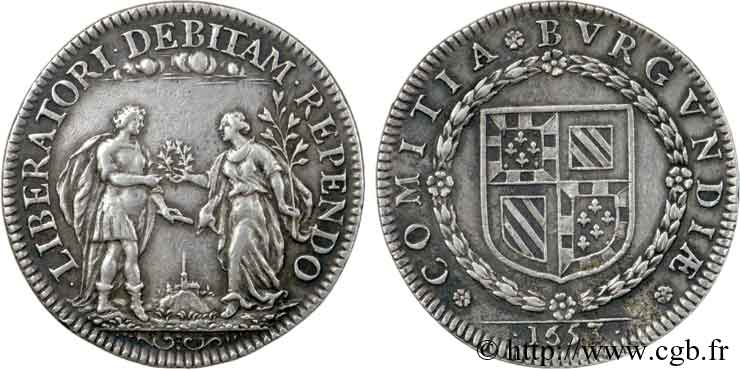
 Cообщить об ошибке
Cообщить об ошибке Распечатать страницу
Распечатать страницу Отправить мой выбор
Отправить мой выбор Задать вопрос
Задать вопрос Consign / sell
Consign / sell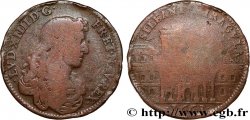
 Информация
Информация